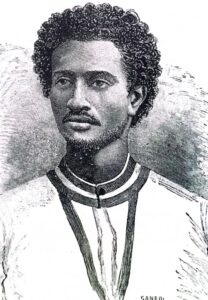ALULA, ALI
- 2 Min Read
Ali Alula (1818-1866) was Ras (High Commander) and ruler of most of central and northern Ethiopia from 1831-1853.

PHOTO CAPTION: Ali Alula. SOURCE: EA Library
He belonged to an originally Muslim Galla family from Yaju in Wallo province, who dominated political life for about 70 years during the so-called Zamana masafent (“Era of the judges”) which lasted from around 1769 to 1855, during which time each man did as he saw fit. Ali’s father, Alula, died when he was a young boy, but three of his uncles succeeded each other as Rases before Ali was elected to the position in 1831, at the age 13.
For almost a decade his mother, Empress Manan dominated the scene at his capital, Dabra Tabor, east of lake Tana, and even after he came of age, he never showed the qualities of a strong and energetic ruler. He was unable to maintain peace and order and safeguard the political unity of the country, which because of the breakdown of imperial authority, had become the task of the Ras.
He was forced to spend his time almost constantly campaigning against rival chiefs, in particular the governors of Gojam (in what is now western Ethiopia) and Semen-Tegre (in what is now northern Ethiopia). Finally, he was overthrown in June 1853 by his own son-in-law Kassa, who became Emperor Tewodros II (reigned 1855-1868).
Alula was noted for his lack of cruelty and his tolerance in religious matters. Nominally a Christian, he remained friendly to Muslims and tried to act as a peace-maker between the quarrelling factions of the Ethiopian Orthodox Church.
He allowed foreigners to live and work in his country. And in 1849 signed a treaty of friendship and commerce with the British government. Because of his failure to provide strong and consistent leadership, he has in one Ethiopian tradition been nicknamed “The Little” in contrast to his great-grandfather Ali Gwangul or Ali the Great. Who in the later 18th century founded the dynasty of Rases which ended with Ali Alula.
SVEN RUBENSON




